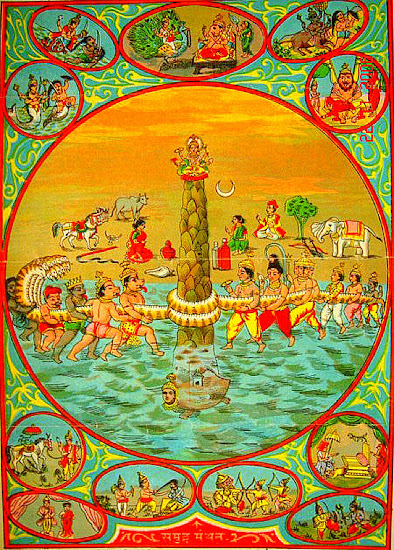The Samudra Manthan or Churning of the Great Ocean of Milk is among the most frequently told stories from the Indian Mythology. Having its mention in various Hindu Texts, this episode has been interpreted by authors in their own way.
This article is an attempt to decode the take-aways for corporates from this celebrated story while narrating it in the Project Flow Framework.
A. PLANNING -
Why Did the Samudra Manthan Happen in the first place?
It starts with Indra, the King of Gods being offered a special garland by Sage Durvasa. Indra, to show his Ego, decorates his Royal Elephant,the Airavata with this garland. Disturbed by the Bees attracted to the flowers in the Garland, Airavata throws away the garland. Infuriated with anger, Sage Durvasa curses Indra and all the Gods to lose all their celestial powers.
When they sought to Vishnu for a remedy, then the Lord suggests the Churning of the Ocean of Milk, in which lies the Nectar of Immortality (Amrit). But, for extra hands in the task, the entire clan of Gods, have to approach the Demons, their half brothers from Sage Kashyap.
The Lessons from the Planning of the Sagar Manthan -
1. The Leader's Actions would result in how the team is perceived. It was only Indra who acted Egoistcally. But his entire clan of Gods/ Demigods had to face the consequence of his misdeed.
2. Approach the Right Leader when in Crisis. It's only your leader who would want the team to succeed as much as the teammates would wish.
3. Keep your End Goal in Mind. Beginning with the right outcome in mind makes planning the project much easier.
4. Diversity in Teams - A professional setup always has teammates who may not get along with each other. But, the success of a project lies in using this diversity to achieve Organizational Goals.
b. EXECUTION -
How was the Churning of the carried out?
It was surely a herculean task. The execution setup itself is very creative! The Mount Mandara was the Churning Rod, The Serpent Vasuki was the Churning Rope and Vishnu took the form of a giant Turtle, the Kurma to stay as a Support to the Mountain.
The Asuras held the serpent by the hood and Devas held the tail to start the churn.
The creative execution setup gives the following lessons -
1. Think Out of the Box - Essentially, every project is like a churn. Plans may seem unreal. But the resource allocation and planning would determine the due course of the result.
2. The Leader should be the greatest support to the team in the execution. We see that the same Vishnu who suggested this activity just did not leave his team. He transformed himself to support them!
3. The team should always have risk-takers to ensure the project isn't halted. Plan your team such that there are always those Asura's take a calculated risk to get your project continuously progressing!
c. OUTCOMES -
What is a project which yields no fruits? Just a mere action without purpose!
The result of its state of the art setup for the Churn was achieved in phases. The first outcome from the ocean was the Halahala, the dangerous poison, which was swallowed by Shiva. Then came a few exotic gifts - The Moon, Goddess Lakshmi, the Flying horse (Uchairshva), the lost Royal Elephant (Airavat), the Wish-Fulfilling Tree (KalpaVriksha) to mention a few. But, the ocean was churned further to get the desired outcome - Amrit.
Distribution of this Nectar was also entrusted on the Leader, Vishnu. For this task, Vishnu took the pleasant Mohini form and gave away the nectar to the worthy teammates, whom he knew would not misuse the immortality.
The outcomes of the Samudra Manthan can be interpreted as -
1. In 99% of projects, the Initial Outcome may not be in favor of the team. But, keep your efforts going.
2. Do not get lured by the smaller mid results of a project! Always work with the end in mind. The outcomes are merely the result of dedication.
3. The Leader still plays an important role to reward all the deserving team members. There are many arguments on the aspect that Vishnu favored the Devas during the distribution of Nectar. But, can we imagine the immortality given to the Demons?
As it is said, Beauty lies in the eyes of the Beholder and the texts, as vast as scriptures, always show a solution if a person has the lens of seeking from them.

The connection of Scriptues with Project Management is brilliant! Enjoyed reading this. I wish you would write more often :) I always gain a new perspective of looking at things from reading your blogs.
ReplyDeleteThank You Zankhana! Writing often is something which i really intend to do. . .
DeleteWell Written!
ReplyDeleteThank You!!
DeleteInsightful.relevant ..well connected.
ReplyDeleteKeep writing God bless you.
Thank You Aunty! means a lot!!
DeleteWell depicted. The linking of samudra manthan with project execution and bringing managerial dimensions is innovative. Every task is a project. Resources are always scarce. Hence the knack of resource allocation and optimization of end result decides the tenacity of leadership.
ReplyDeleteThank You Sir!
DeleteWell written Varun. Enjoy reading your work.
ReplyDeleteThank You Ma'am!! Your OB classes have surely inspired me a lot!! 😊
DeleteThank You Ma'am!! Your OB classes have surely inspired me a lot!! 😊
DeleteThis comment has been removed by the author.
ReplyDeleteInteresting perspective, Varun. Good one! 😊
ReplyDelete